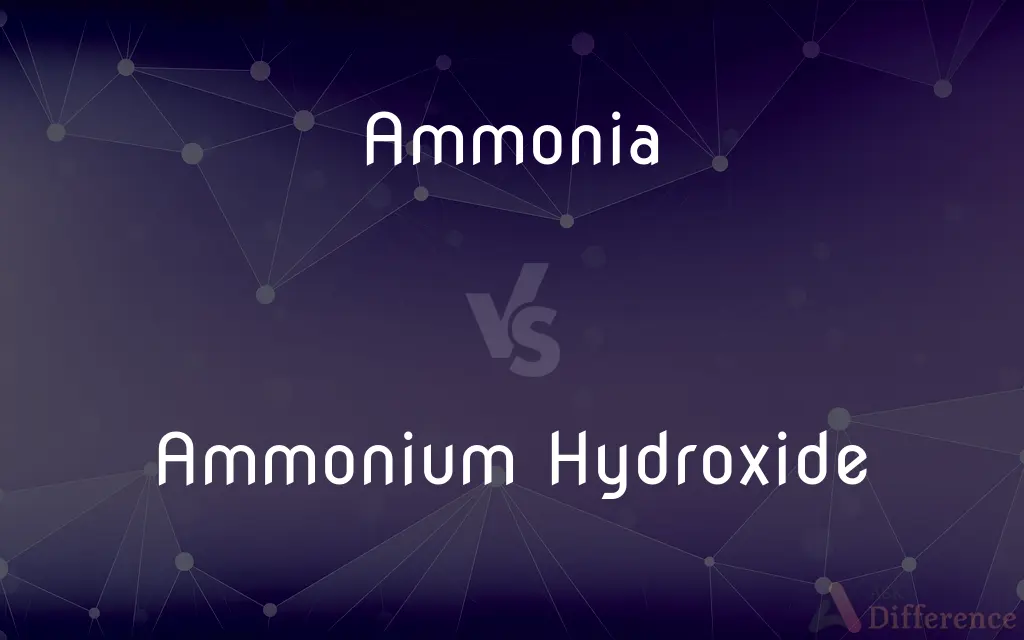Ammonia vs. Ammonium Hydroxide — What's the Difference?
By Tayyaba Rehman — Published on December 22, 2023
Ammonia is a colorless gas with the formula NH₃, while Ammonium Hydroxide is a solution of ammonia in water, often referred to as "household ammonia."

Difference Between Ammonia and Ammonium Hydroxide
Table of Contents
ADVERTISEMENT
Key Differences
Ammonia and Ammonium Hydroxide are both associated with the compound NH₃, but they exist in different states and have distinct properties. While Ammonia refers to the gaseous form, NH₃, Ammonium Hydroxide pertains to ammonia that's been dissolved in water.
Commonly encountered in industrial and household settings, Ammonia is a versatile compound used in various applications, from refrigeration to fertilizer production. On the other hand, Ammonium Hydroxide, being a water-based solution, is often used as a cleaning agent or in chemical formulations.
In terms of chemical behavior, Ammonia is a weak base that can accept protons, whereas Ammonium Hydroxide is the result when Ammonia accepts a proton from water, leading to the formation of ammonium ions (NH₄⁺) and hydroxide ions (OH⁻).
Safety considerations differ for Ammonia and Ammonium Hydroxide. In its gaseous form, Ammonia can be hazardous if inhaled in large amounts and needs proper storage. Meanwhile, Ammonium Hydroxide, especially in high concentrations, can be caustic and requires care in handling.
From a linguistic viewpoint, it's vital to distinguish between the two, as using them interchangeably can cause confusion. While "Ammonia" refers exclusively to the gas, "Ammonium Hydroxide" denotes the aqueous solution, a distinction crucial for safety and accurate communication.
ADVERTISEMENT
Comparison Chart
State
Gaseous
Aqueous solution
Chemical Formula
NH₃
NH₃ in H₂O (contains NH₄⁺ and OH⁻ ions)
Common Uses
Refrigeration, fertilizers
Cleaning agent, chemical formulations
Nature
Weak base
Basic solution (due to OH⁻ ions)
Safety Concerns
Inhalation hazard
Caustic, especially in high concentrations
Compare with Definitions
Ammonia
A colorless gas with a pungent smell.
The smell in the lab indicated a possible ammonia leak.
Ammonium Hydroxide
Used as a stabilizer in food processing.
Some food manufacturers use ammonium hydroxide as a safety measure against pathogens.
Ammonia
Used as a refrigerant in industrial applications.
The refrigeration system utilizes ammonia due to its cooling properties.
Ammonium Hydroxide
Often referred to as "household ammonia."
She used ammonium hydroxide to clean the windows.
Ammonia
A compound with the chemical formula NH₃.
Ammonia is used in the manufacture of various chemicals.
Ammonium Hydroxide
A basic solution used in various chemical reactions.
The reaction required the addition of ammonium hydroxide.
Ammonia
A building block for the synthesis of many pharmaceuticals.
The pharmaceutical industry relies on ammonia for several products.
Ammonium Hydroxide
A solution of ammonia gas dissolved in water.
Ammonium hydroxide is a common ingredient in household cleaners.
Ammonia
A significant component in the nitrogen cycle.
Plants take up ammonia from the soil, converting it to amino acids.
Ammonium Hydroxide
Contains both ammonium (NH₄⁺) and hydroxide (OH⁻) ions.
When ammonia dissolves in water, it forms ammonium hydroxide, releasing OH⁻ ions.
Ammonia
A colorless, pungent gas, NH3, extensively used to manufacture fertilizers and a wide variety of nitrogen-containing organic and inorganic chemicals. Ammonia is the chief nitrogen product excreted by fish and other aquatic animals.
Ammonia
See ammonium hydroxide.
Ammonia
(inorganic compound) A gaseous compound of hydrogen and nitrogen, NH3, with a pungent smell and taste.
Ammonia
A solution of this compound in water used domestically as a cleaning fluid.
Never use ammonia to clean metal writing pens.
Ammonia
A gaseous compound of hydrogen and nitrogen, NH3, with a pungent smell and taste: - often called volatile alkali, and spirits of hartshorn.
Ammonia
A pungent gas compounded of nitrogen and hydrogen (NH3)
Ammonia
A water solution of ammonia
Common Curiosities
Can ammonium hydroxide be used as a fertilizer like ammonia?
While both contain nitrogen, ammonia is more commonly used in fertilizers.
Are ammonia and ammonium hydroxide the same?
No, ammonia is a gas, while ammonium hydroxide is its water solution.
Is ammonia a solid, liquid, or gas?
Ammonia is a colorless gas at room temperature.
Is ammonium hydroxide present in food?
It's sometimes used in food processing as a stabilizer or pH adjuster.
How is ammonia produced?
One primary method is the Haber-Bosch process, combining nitrogen and hydrogen.
What is the primary use of ammonium hydroxide in households?
Ammonium hydroxide is commonly used as a cleaning agent.
Is inhaling ammonia dangerous?
Yes, inhaling large amounts of ammonia can be hazardous to health.
Why is ammonia used in refrigeration?
Ammonia has excellent cooling properties and is efficient as a refrigerant.
How should one store ammonium hydroxide?
It should be stored in a cool, well-ventilated area away from acids and heat sources.
Can I make ammonium hydroxide at home?
By dissolving ammonia gas in water, you can produce ammonium hydroxide. However, it's generally safer to purchase it pre-made.
Can ammonium hydroxide burn the skin?
Yes, in high concentrations, it can be caustic and cause burns.
Is ammonium hydroxide a strong or weak base?
It's a weak base, given its derivation from ammonia.
How do ammonia and ammonium hydroxide affect aquatic life?
Both can be toxic to aquatic life, especially in high concentrations.
Are ammonia and ammonium hydroxide flammable?
Ammonia can be flammable under specific conditions, but ammonium hydroxide is generally not.
Are ammonia and ammonium hydroxide safe for the environment?
In large amounts, they can be harmful; it's crucial to manage and dispose of them properly.
Share Your Discovery

Previous Comparison
Essentialism vs. Relativism
Next Comparison
Act Utilitarianism vs. Rule UtilitarianismAuthor Spotlight
Written by
Tayyaba RehmanTayyaba Rehman is a distinguished writer, currently serving as a primary contributor to askdifference.com. As a researcher in semantics and etymology, Tayyaba's passion for the complexity of languages and their distinctions has found a perfect home on the platform. Tayyaba delves into the intricacies of language, distinguishing between commonly confused words and phrases, thereby providing clarity for readers worldwide.
















































